From: Premier of Ontario | Première ministre de l’Ontario <Premier@ontario.ca>
Date: Sat, 17 Feb 2018 22:33:28 +0000
Subject: Automatic reply: Fidel Castro is or isn’t Trudeau’s real
father. Survey Says?
To: David Amos <motomaniac333@gmail.com>
Thanks for your email. I value your input and appreciate your taking
the time to get in touch with me.
Every email and letter I receive is carefully read and reviewed. Given
the volume of emails and letters I receive, and because I may need to
share your message with one of my Cabinet ministers or the appropriate
government officials for more information, a response may take several
business days.
Thanks again for contacting me.
Kathleen Wynne
Premier
Please note that we are not able to receive replies at this email
address, so please do not respond directly to this email.
* * *
Je vous remercie de votre courriel. Votre avis est important pour moi
et je vous suis reconnaissante d’avoir pris le temps de m’écrire.
Toutes les lettres et tous les courriels que je reçois sont lus
attentivement, un par un. Sachez, cependant, qu’en raison du volume
important de correspondance que je reçois et parce qu’il se peut que
j’aie à consulter l’un de mes collègues du Conseil des ministres ou un
fonctionnaire compétent en la matière, il pourrait s’écouler plusieurs
jours avant que je puisse donner suite à votre courriel.
Meilleures salutations,
Kathleen Wynne
Première ministre de l’Ontario
Veuillez ne pas répondre directement à ce courriel, car aucun courriel
ne peut être reçu à cette adresse.
---------- Original message ----------
From: "Brown, Patrick" <patrick.brown@pc.ola.org>
Date: Sat, 17 Feb 2018 22:33:25 +0000
Subject: Automatic reply: Fidel Castro is or isn’t Trudeau’s real
father. Survey Says?
To: David Amos <motomaniac333@gmail.com>
Thank you very much for getting in touch. Due to the large volume of
mail that I receive, please allow time for a response. If it is a
pressing issue, please call my Queen’s Park office at 416-325-3855.
Otherwise, I will respond as soon as possible.
Regards,
Patrick Brown, MPP
Simcoe North
Leader of the Official Opposition
---------- Original message ----------
From: Caroline Mulroney <caroline@carolinemulroney.ca>
Date: Sat, 17 Feb 2018 14:33:25 -0800
Subject: Thank you for your message! Re: Fwd: Fidel Castro is or isn’t
Trudeau’s real father. Survey Says?
To: motomaniac333@gmail.com
Caroline Mulroney Campaign
416-922-0573
www.CarolineMulroney.ca
---------- Original message ----------
From: Premier <PREMIER@novascotia.ca>
Date: Sat, 17 Feb 2018 22:33:25 +0000
Subject: Automatic reply: Fidel Castro is or isn’t Trudeau’s real
father. Survey Says?
To: David Amos <motomaniac333@gmail.com>
Thank you for your email to Premier McNeil.
This is an automatic confirmation your email has been received.
Warmest Regards,
Premier's Correspondence Team
---------- Original message ----------
From: "Eby.MLA, David" <David.Eby.MLA@leg.bc.ca>
Date: Sat, 17 Feb 2018 22:33:35 +0000
Subject: Automatic reply: Fidel Castro is or isn’t Trudeau’s real
father. Survey Says?
To: David Amos <motomaniac333@gmail.com>
This automated response is to assure you that your message has been
received by my community office and will be reviewed as soon as
possible. Please note that constituents of Vancouver-Point Grey have
priority. Please be sure to respond back and include your home address
or postal code to confirm you are a resident of Vancouver-Point Grey.
If you are not a local resident, please contact your MLA's office for
assistance. To find out which MLA represents your neighbourhood, you
can enter your postal code here to get their contact information:
https://www.leg.bc.ca/learn-
If you are writing to David Eby regarding his responsibilities as the
Attorney General, or as the Minister Responsible for ICBC, liquor
policy, or BCLC (gaming policy and enforcement) please direct your
correspondence to the Minister at
AG.Minister@gov.bc.ca
> where staff with
expertise on these issues will receive, review, and respond as
required to your correspondence. Our constituency office will not be
responding to emails related to David Eby's work as a Minister.
If you are writing to David with a media request, please direct your
correspondence to Communications Director Tiffany Nelson. She can be
reached at Direct: 250-356-6334 Cell: 250-858-4680 Email:
Tiffany.Nelson@gov.bc.ca.
Due to the overwhelming volume of correspondence received and our
limited capacity, we are not able to respond personally to every
inquiry. In most cases, anonymous, cc'd, and forwarded items will not
receive a response. Please do not hesitate to contact the office
should you have any questions regarding the status of your query.
Should you have a situation that requires immediate attention, please
call Service BC (www.servicebc.gov.bc.ca), toll-free at
1-800-663-7867
appropriate government ministry.
Thanks again for writing,
Community office of David Eby MLA, Vancouver-Point Grey
2909 West Broadway, Vancouver BC V6K 2G6
604-660-1297 | www.davidebymla.ca
---------- Original message ----------
From: David Amos <motomaniac333@gmail.com>
Date: Sat, 17 Feb 2018 18:33:21 -0400
Subject: Fwd: Fidel Castro is or isn’t Trudeau’s real father. Survey Says?
To: baxter@yournewswire.com, contact@yournewswire.com,
sean@yournewswire.com, washington field <washington.field@ic.fbi.gov>,
djtjr <djtjr@trumporg.com>, mcu <mcu@justice.gc.ca>,
Brian Ruhe <brian@brianruhe.ca>, paul <paul@paulfromm.com>,
patrick_doran1 <patrick_doran1@hotmail.com>, cps <cps@calgarypolice.ca>,
"patrick.brown" <patrick.brown@pc.ola.org>, campaign <campaign@tanyagranicallen.com
"carl.urquhart" <carl.urquhart@gnb.ca>, "kirk.macdonald" <kirk.macdonald@gnb.ca>,
"bill.pentney" <bill.pentney@justice.gc.ca>, "bill.sweeney" <bill.sweeney@gov.ab.ca>, "Kathleen.Ganley" <Kathleen.Ganley@assembly.ab.
"brian.jean" <brian.jean@assembly.ab.ca>, premier <premier@ontario.ca>,
Cc: David Amos <david.raymond.amos@gmail.com>
http://davidraymondamos3.
Saturday, 17 February 2018
Fidel Castro is or isn’t Trudeau The Younger’s real father. Survey Says?
http://www.cbc.ca/news/world/castro-son-fidelito-diaz-balart-suicide-1.4516027
Fidel Castro's son has died by suicide, state media say
Fidel Castro Diaz-Balart was for a time head of Cuba's national nuclear program
Thomson Reuters Posted: Feb 01, 2018 9:28 PM ET

The nuclear scientist, also known as "Fidelito," or Little Fidel, because of how much he looked like his father, had initially been hospitalized and then continued treatment as an outpatient.
"Castro Diaz-Balart, who had been attended by a group of doctors for several months due to a state of profound depression, committed suicide this morning," Cubadebate website said.
Fidelito, who had the highest public profile of all Castro's children, was born in 1949 out of his brief marriage to Mirta Diaz-Balart before he went on to topple a U.S.-backed dictator and build a communist-run state on the doorstep of the United States during the Cold War.
Dramatic custody dispute
Through his mother, he was the cousin of some of Castro's most bitter enemies in the Cuban American exile community, U.S. Representative Mario Diaz-Balart and former U.S. congressman Lincoln Diaz-Balart.
He was also the subject of a dramatic custody dispute between the two families as a child.

Castro was able to bring Fidelito back to Cuba after the 1959 revolution.
Multilingual nuclear physicist
A multilingual nuclear physicist who studied in the former Soviet Union, Castro Diaz-Balart had been working for his uncle President Raul Castro as a scientific counselor to the Cuban Council of State and vice-president of the Cuban Academy of Sciences at the time of his death.
Previously, from 1980 to 1992, he was head of Cuba's national nuclear program, and spearheaded the development of a nuclear plant on the Caribbean's largest island until his father fired him.
Cuba halted its plant plans that same year because of a lack of funding after the collapse of Cuba's trade and aid ties with the ex-Soviet bloc and Castro Diaz-Balart largely disappeared from public view, appearing at the occasional scientific conference or diplomatic event.
A former British ambassador to Cuba, Paul Hare, who lectures at Boston University's Pardee School of Global Studies, said he had seemed "thoughtful, rather curious about the world beyond Cuba" at a dinner in Boston two years ago. "But he seemed a bit weary about having to be a Castro, rather than himself," Hare said.
Jonathan Benjamin-Alvarado, a Cuba expert at the University of Nebraska in Omaha, said Fidelito had provided him with invaluable help in the 1990s while he was writing a book on Cuba's nuclear program.
In 2000 they met again at a conference in Moscow and Fidelito worked "the room full of international nonproliferation experts, diplomats and journalists with aplomb, speaking no less than four languages: Spanish, English, Russian and French."
His death came just over a year after that of his father on Nov. 25, 2016, aged 90.
http://www.cbc.ca/news/politics/fidel-castro-trudeau-condolences-1.3869280
Trudeau faces backlash after Castro tribute
'My father was very proud to call him a friend,' PM says of Castro

The prime minister is facing criticism for his statement expressing "deep sorrow" about the death of the controversial former Cuban president Fidel Castro.
Justin Trudeau posted a written statement early Saturday after the late-night announcement that Castro had died at the age of 90.
Trudeau remembered the late president as a "legendary revolutionary and orator," and said he was a good friend of his father's.
But others in Canada were less generous in their description of the controversial leader.
Opposition leader Rona Ambrose said in a written statement that under Castro's rule, thousands of people were impoverished, imprisoned and executed.
"My thoughts and prayers are with the people of Cuba who continue to endure his long and oppressive regime, even after his death," she wrote.
NDP Leader Tom Mulcair shared a similar message on Twitter.
Foreign Affairs Minister Stéphane Dion was also more subdued when responding to Castro's death on Twitter.
An iconic figure of the 20th century passed away last night. Deepest condolences to the people of #Cuba, following the death of Fidel Castro https://t.co/1d8u2eZNJQ
—
@MinCanadaFA
Trudeau condemned on social media
And many people — particularly members of the Conservative Party — are condemning the prime minister's statement, pointing out human rights violations during Castro's half-century regime.
Conservative leadership hopeful Lisa Raitt wrote on Facebook that Trudeau should be ashamed of himself after his remarks.
"With those words, Justin Trudeau has placed himself on the wrong side of history — against the millions of Cubans yearning for freedom. The Prime Minister should be ashamed of himself. He must retract this statement and apologize," she wrote.
Raitt added in her open letter to Trudeau that he "dismissed Castro's crimes as simply 'controversial.' They were not controversial. They were egregious crimes against humanity, and you should be ashamed to give your approval to a brutal regime that exported terror."
Raitt also called on Trudeau to "decline in the strongest terms" if he is invited to Castro's funeral.
"Canada must not be seen celebrating the life of a tyrant," she wrote.
Maxime Bernier, Quebec MP and a candidate for the leadership of the Conservative Party, turned to social media to express his disbelief at Trudeau's tribute, calling it repugnant.
"I can't believe our PM is expressing 'deep sorrow' and calling [Castro a] 'legendary revolutionary' and 'remarkable leader,'" Bernier said on Twitter.
Bernier also called Castro a "despicable dictator who killed and imprisoned thousands of innocents and drove away in exile more than a million."
"He persecuted gay people, he was against freedom of speech and repressed free expression. He was not a president. He's a dictator. So I'm not very comfortable with that press release," he told The Canadian Press.
Conservative leadership hopeful Kellie Leitch wrote on Facebook that Trudeau should have called Castro's administration "brutal, oppressive, and murderous," rather than describing him "as if reading from a storybook."
And while former prime minister Stephen Harper hasn't weighed in, his son Ben Harper has.
The younger Harper tweeted that Trudeau's statement is "an embarrassment for Canada."
International reaction
Others mocked the prime minister's praise for Castro and tweeted fake eulogies for other polarizing figures using the hashtag #trudeaueulogies. Trudeau's comments also garnered criticism in the United States, a long-time political adversary of Cuba.
U.S. Senator for Florida Marco Rubio, who also ran against Trump in the last presidential election, questioned if Trudeau's statement was real or a parody and said it's shameful and embarrassing if it's real.
Texas Senator and former Republican presidential hopeful Ted Cruz also commented on Trudeau's statement on Twitter saying, "Disgraceful. Why do young socialists idolize totalitarian tyrants? Castro, Stalin, Mao, Pol Pot — all evil, torturing murderers."
Cruz got a response from Canadian Senator Leo Housakos who said, "Sadly, our [PM] has no respect for our democratic way of life and basic human rights and freedom."
Website Breitbart News, which was previously run by president-elect Donald Trump's senior strategist, called the prime minister a "pretty little liar" in response to his comments.
And Ian Bremmer, an American political scientist who specializes in U.S. foreign policy, tweeted that "Cuban citizens and exiles deserve better" from Trudeau.
'Larger than life leader'
In his statement, Trudeau remembered Castro as "a larger than life leader."
Trudeau, who is attending the Francophonie Summit in Madagascar, expressed his deep sorrow at learning of Castro's passing.
His statement offered condolences on behalf of all Canadians and at the same time acknowledged that Castro was "a controversial figure."
Castro was divisive. To some, he was a revolutionary icon. To others, he was a totalitarian dictator. His system of one-man and one-party rule kept him in power for 49 years, the longest of any head of government in the world.
Trudeau also referred to the late president as a "legendary revolutionary and orator."
The prime minister went on to say that "Mr. Castro made significant improvements to the education and healthcare of his island nation."
"We join the people of Cuba today in mourning the loss of this remarkable leader," the prime minister said. "I know my father was very proud to call him a friend."
http://www.cbc.ca/news/politics/trudeau-castro-special-relationship-1.3845742
Justin Trudeau heads to Cuba, decades after his father's history-making trip
Pierre Trudeau was 1st NATO leader to visit Fidel Castro's Cuba in 1976
 Prime Minister Pierre Trudeau is greeted by President Fidel Castro
after arriving in Cuba on Jan. 26, 1976. (Fred Chartrand/Canadian Press) 1 of 11
Prime Minister Pierre Trudeau is greeted by President Fidel Castro
after arriving in Cuba on Jan. 26, 1976. (Fred Chartrand/Canadian Press) 1 of 11Now, his son, Prime Minister Justin Trudeau, is heading to the Caribbean country Tuesday to try and rekindle the special bond as part of a three-country tour that will also take him to Argentina and Peru, where an APEC summit is being held.
The current prime minister faces a much different Cuba than his father, who descended on the fledgling Communist country at a tense time, while the Cold War was raging.
"Canadians imagine a special kind of relationship, because it's not one the Americans had, and it all harkens back to that Trudeau visit. We have been dining out on that idea in Cuba ever since," Robert Wright, the author of Three Nights in Havana, the definitive account of the trip, said in an interview with CBC News.

3 Nights in Havana
More than 250,000 people turned out on the streets of Havana to welcome Pierre Trudeau, Wright said, interpreting his visit as a friendly gesture amid global tumult.
But the visit wasn't quite as well-received in Canada, where critics said the prime minister was lending legitimacy to an authoritarian regime backed by the big guns in Moscow.

"Trudeau went expecting not to change Fidel's mind, or have his own mind changed, but rather to be able to sit down and speak respectfully with someone whose ideas he didn't share."
"These two somewhat aloof, cerebral, contained, emotionally unapproachable guys hit it off. Fidel was smitten by him."
Trudeau was equally taken by the revolutionary turned dictator, provocatively shouting "Long live Prime Minister Fidel Castro!" in his address to the Cuban people.
Castro, who was seven years younger than Trudeau, came to see the Canadian leader as a mentor, someone he trusted, Wright said, and a leader with whom he regularly consulted.
It was more than friendly relations among world leaders, it was, as Alexandre Trudeau would write in a glowing tribute to the Cuban leader in a 2006 newspaper op-ed, "extra-political."
"Indeed, like my father, in private, Fidel is not a politician. He is more in the vein of a great adventurer or a great scientific mind. Fidel doesn't really do politics. He is a revolutionary."
Castro was particularly fond of Michel, Justin's late brother, who accompanied his father and mother, Margaret, on that 1976 trip.
"He was falling all over the baby, cooing for the cameras," Wright said.

Castro, Wright said, was devastated by Michel's death in an avalanche in 1998, and was equally distraught when Pierre Trudeau died. He made the trip to Montreal for Trudeau's state funeral, where he was seen hugging a teary Justin.

The visit is also for roughly 24 hours, and won't include a great deal of personal time to forge closer ties.
"If 'Viva Raul' is uttered by the prime minister, I'd be very surprised," Wright said.
He also doesn't expect Trudeau to push too hard on the country's persistent problems with human rights, saying Trudeau will likely follow a similar tack to the one he took during a recent visit to China.
"It's not likely that he will go to Havana with any kind of heavy-handed agenda on political reforms. He has to walk that knife's edge."
But the trip to Havana won't be complete, Wright said, without paying a visit to his father's old chum.
"Presuming that Fidel is well enough, and lucid enough, to see him. I'd be very surprised if that wasn't on the agenda, even if briefly."
Corrections
-
This article has been changed to remove a reference to Pierre Trudeau being the first Western leader to visit Cuba after the revolution. The Swedish prime minister was the first Western head of government to visit in 1975.Nov 29, 2016 10:43 AM ET
---------- Original message ----------
From: David Amos <motomaniac333@gmail.com>
Date: Sat, 17 Feb 2018 13:00:50 -0400
Subject: Re: Fidel Castro is or isn’t Trudeau’s real father. Survey Says?
To: "David.Akin" <David.Akin@globalnews.ca>, "jeremy.keefe" <jeremy.keefe@globalnews.ca>, "Robert. Jones" <Robert.Jones@cbc.ca>, newsroom <newsroom@globeandmail.ca>,
news <news@kingscorecord.com>, "ht.lacroix" <ht.lacroix@cbc.ca>,
"sylvie.gadoury" <sylvie.gadoury@radio-canada.
"Dominic.Cardy" <Dominic.Cardy@gnb.ca>, "brian.gallant" <brian.gallant@gnb.ca>,
"rick.doucet" <rick.doucet@gnb.ca>, nmoore <nmoore@bellmedia.ca>,
oldmaison <oldmaison@yahoo.com>, andre <andre@jafaust.com>,
jbosnitch <jbosnitch@gmail.com>, markandcaroline <markandcaroline@gmail.com>,
COCMoncton <COCMoncton@gmail.com>, "Jacques.Poitras" <Jacques.Poitras@cbc.ca>, "Jack.Keir" <Jack.Keir@gnb.ca>, "greg.byrne" <greg.byrne@gnb.ca>,
"randy.mckeen" <randy.mckeen@gnb.ca>, hsegal <hsegal@airdberlis.com>,
news-tips <news-tips@nytimes.com>, weeklydrawing@screenhoopla.com
Cc: david.raymond.amos@gmail.com, pm <pm@pm.gc.ca>,
"justin.trudeau" <justin.trudeau@parl.gc.ca>, "Gerald.Butts" <Gerald.Butts@pmo-cpm.gc.ca>, "andrew.scheer" <andrew.scheer@parl.gc.ca>, "Kellie.Leitch" <Kellie.Leitch@parl.gc.ca>, "Bill.Morneau" <Bill.Morneau@canada.ca>, "maxime.bernier" <maxime.bernier@parl.gc.ca>, "guy.caron" <guy.caron@parl.gc.ca>, "Karen.Ludwig" <Karen.Ludwig@parl.gc.ca>,
"Alaina.Lockhart" <Alaina.Lockhart@parl.gc.ca>
---------- Forwarded message ----------
From: "MinFinance / FinanceMin (FIN)" <fin.minfinance-financemin.
Date: Sat, 17 Feb 2018 16:49:21 +0000
Subject: RE: Fidel Castro is or isn’t Trudeau’s real father. Survey Says?
To: David Amos <motomaniac333@gmail.com>
The Department of Finance acknowledges receipt of your electronic
correspondence. Please be assured that we appreciate receiving your
comments.
Le ministère des Finances accuse réception de votre correspondance
électronique. Soyez assuré(e) que nous apprécions recevoir vos
commentaires.
---------- Forwarded message ----------
From: "Gallant, Premier Brian (PO/CPM)" <Brian.Gallant@gnb.ca>
Date: Sat, 17 Feb 2018 16:49:19 +0000
Subject: RE: Fidel Castro is or isn’t Trudeau’s real father. Survey Says?
To: David Amos <motomaniac333@gmail.com>
Thank you for writing to the Premier of New Brunswick. Please be
assured that your email will be reviewed.
If this is a media request, please forward your email to
media-medias@gnb.ca
>. Thank you!
******************************
Nous vous remercions d’avoir communiqué avec le premier ministre du
Nouveau-Brunswick. Soyez assuré(e) que votre courriel sera examiné.
Si ceci est une demande médiatique, prière de la transmettre à
media-medias@gnb.ca
On 2/17/18, David Amos <motomaniac333@gmail.com> wrote:
No, internet, Fidel Castro isn’t Trudeau’s real father. The Canadian prime minister just really, really looks like him
The only way Castro could have fathered Justin is if a 22-year-old Margaret slipped away to stage an unprotected tryst with a communist leader she had never met

https://www.bbc.com/news/world-latin-america-42916264
Death of Fidel Castro's son 'Fidelito' reveals a divided family
By Will Grant
Cuba correspondent, BBC News
Published
Traditionally in Cuba, the first son is named after his father or his grandfather.
When Fidel Angel Castro Diaz-Balart was born in 1949, he was given the names of both: Fidel after his father, then a little-known but politically ambitious lawyer, and Angel for his grandfather, a Spanish immigrant who had become a wealthy landowner in eastern Cuba.
As Fidel Angel grew up, people just called him affectionately "Fidelito".
The diminutive nickname stuck, even after his father had become one of the most recognisable faces of the 20th Century, a Cold War icon who divided opinion around the world, and Fidelito himself a respected nuclear physicist.
Despite his fame and notoriety, Fidel Castro remained intensely private about his family until his death in 2016.
It was preparing for the revolution in the early days that he made his first decisive act over his son.
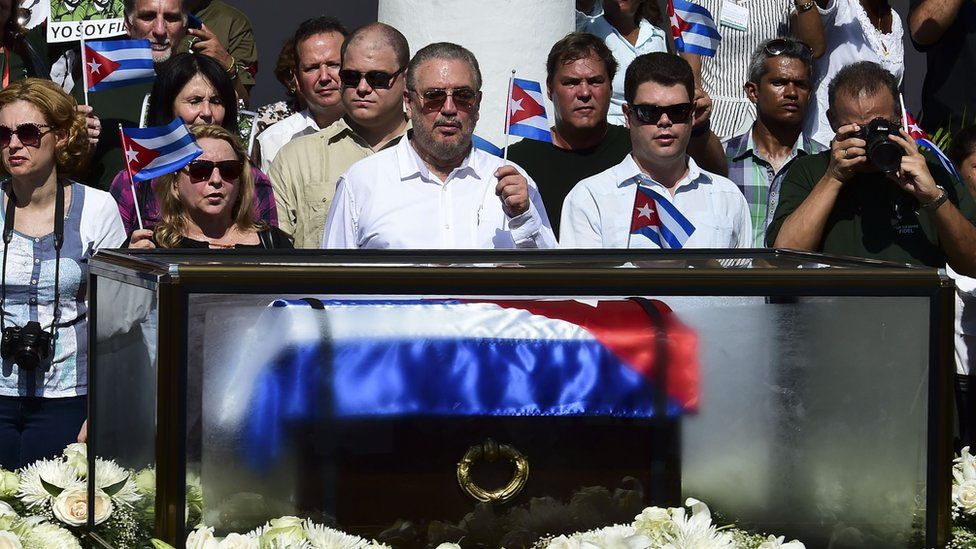
Already divorced from Fidelito's mother, Mirta Diaz-Balart, Fidel arranged for his young son to visit him in exile in Mexico where he was planning the overthrow of the Batista dictatorship in Havana.
Taking a typically uncompromising position on something that mattered to him, Fidel simply refused to send the boy home to his mother.
Tough act to follow
It wouldn't be the last time Fidel Castro flexed his iron will over family affairs, ensuring that his son would eventually be educated in the Soviet Union rather than reside with his mother in Spain or the US.
It might be hard to recall today just how significant a figure Fidel Castro was at the height of his power and, as such, what it must have been like to be his son.
With Fidelito's death on Friday, comparisons have been made to being the child of a superstar actor or musician. But the reality goes much further because in Cuba, Fidel was everything.
He was often the first voice people heard in the morning when they turned on their radios and the last one they heard at night before going to bed.
He was involved in every aspect of Cuban life - political, economic and cultural - and he was revered by some almost as a God, if not a kind of prophet.
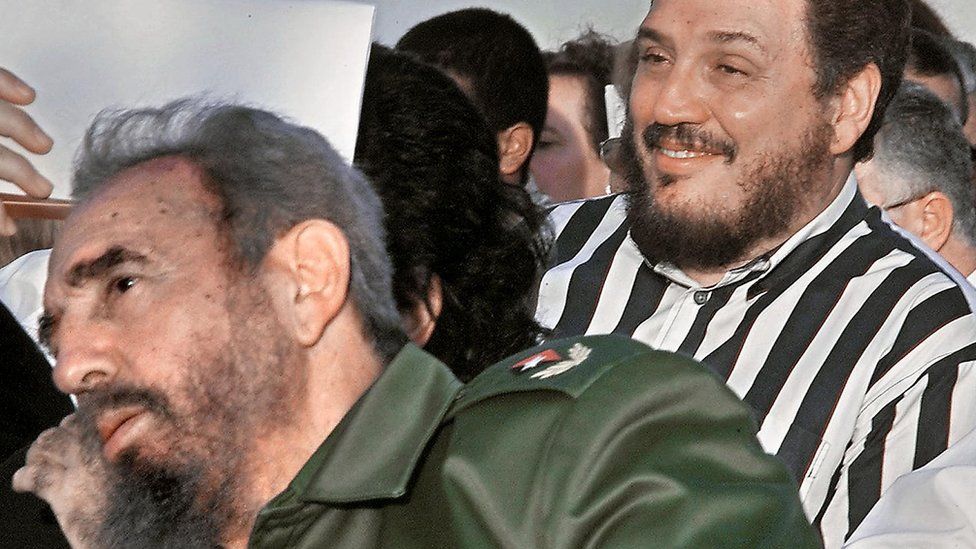
It was never expected of Fidelito that he would try to fill those enormous guerrilla boots, but the stresses of the constant comparison must have been difficult to live with.
Even when he had become a successful nuclear physicist, he couldn't shake off Fidel's shadow.
His father even once sacked him as head of the island's nuclear programme for "incompetence", showing he was prepared to wield the axe against his own family if needed when it came to putting the revolution first.
Divided clan
Then there were the other family connections. Never was a family more ideologically split than the Castro Diaz-Balarts.
After his parents divorced, Fidelito's mother, Mirta, moved to Spain. Her brother, Rafael Diaz-Balart, whom Fidel Castro detested, had been a politician in Batista's government.
Today, his sons Lincoln and Mario Diaz-Balart have both been US lawmakers for Florida, representing staunchly anti-Castro positions on Cuba.
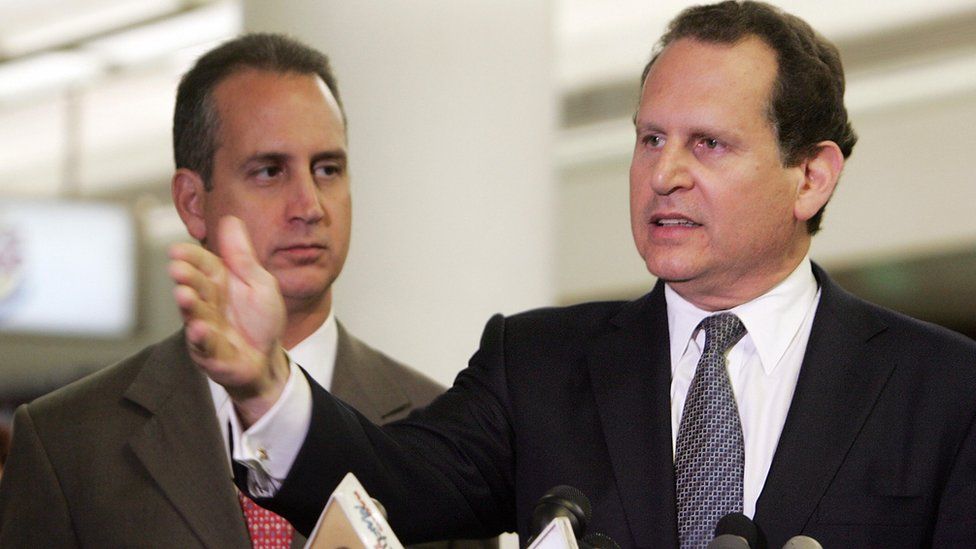
They are Fidelito's cousins but neither man has offered their condolences so far, at least not in public.
The Castro clan is, at times, as complex as the family whose lives it somehow echoed in Washington: the Kennedys.
Taboo subject
Similarly beset with the pressures and responsibilities of office from a young age, and the years marked with the occasional family tragedy, the two eldest sons, Fidelito and John Jr Kennedy, might have found they had much in common if they'd ever had the chance to drink a rum and smoke a cigar together.
After his long training in the USSR, Fidelito grew into a highly skilled man, fluent in English, Russian, French and Spanish.
He was considered one of the best scientists in his field. His tragic end - taking his own life after efforts were made to treat him for clinical depression - comes just over a year after the death of his iconic father.
Suicide is still a taboo subject in Cuba. Once even considered "anti-revolutionary", it is much more common than generally reported on the island.
Perhaps in the final analysis, Fidelito Castro will be remembered as someone who had tried his best to make his own name, despite the evident weight of the one he was given.
https://www.bbc.com/news/world-latin-america-41510650
Ernesto Guevara: How my father inspired my Cuban motorcycle tours
By Will Grant
Cuba correspondent, BBC News
Published
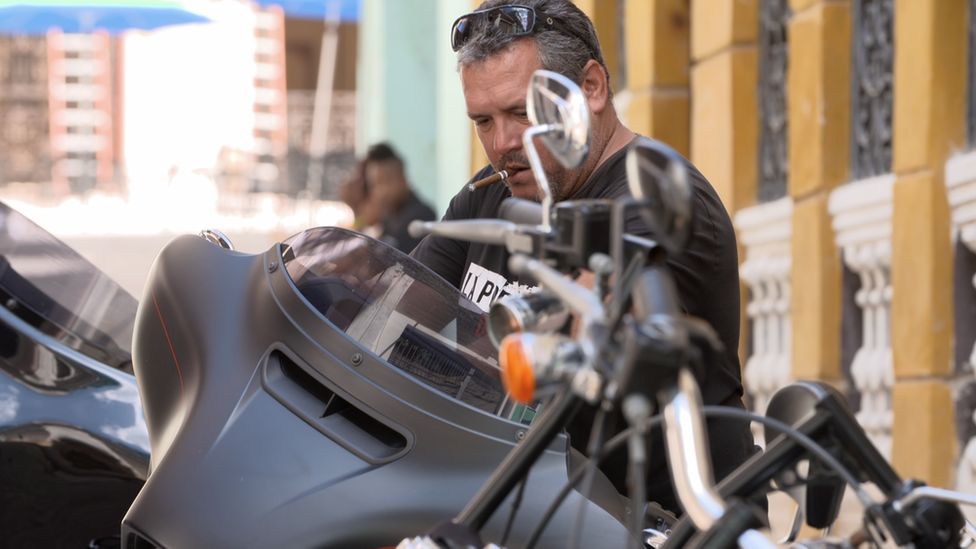
On 9 October 1967, guerrilla leader Ernesto "Che" Guevara was executed in Bolivia. Fifty years on, the BBC's Will Grant takes a motorbike tour of Cuba with the leader's son and asks him about the pressures of living under his father's legacy.
At times, the family resemblance is uncanny.
The stubbly beard, the unmistakable nose, the similarity extending down to a smouldering cigar clasped firmly between his forefingers.
Beyond the physical attributes, the youngest son of Latin America's most recognisable revolutionary, Ernesto "Che" Guevara, has inherited another trait from his late father: his love of motorbikes.
"I've always liked mechanics, speed, motorbikes, cars," said 52-year-old Ernesto, named after his father, over a cold drink in a Harley Davidson-themed bar in Havana.
"As a child I was interested in repairing cars and bikes. I suppose it's something I picked up from my old man but wherever it's from, I love it."
Despite the shared passion, the younger Guevara has taken a very different path in life: into tourism.
He runs a motorbike tour company whose only link to Che is in the name, La Poderosa Tours after La Poderosa, the famous Norton 500cc on which his father crossed the Americas in the Motorcycle Diaries.
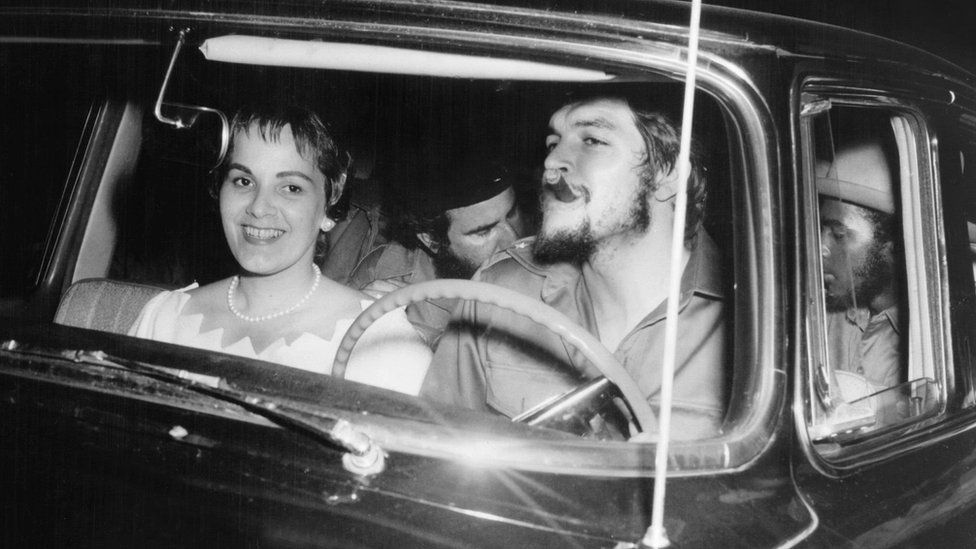
Image source, AFP
La Poderosa Tours is a private company using foreign capital and works with several state-run Cuban companies. It is part of the wave of private enterprise permitted under rule changes by President Raul Castro in 2010, and a far cry from Ernesto's training as a lawyer.
When I joined him on a recent tour, we headed out west, towards the tobacco-growing region of Pinar del Río.
Heads turned on the streets of Havana as the fleet of Harley Davidsons swept out of the capital.
The motorbike is proving an increasingly popular way to see the island. The tour group was a broad cross-section of nationalities including riders from the United States, China, Britain and Argentina.
"Americans my age have never been able to come to Cuba and now we can," reflected amateur bike enthusiast Scott Rodgers from Massachusetts when we stopped for coffee.
"I don't know long that is going to last so I thought I had to jump through this window while I could."
Others were directly drawn to the link to Che, including Eduardo Lopez, a fellow Argentine.
"Of course he is part of the attraction," Eduardo said. "Travelling the world by motorbike is my hobby but we specifically came on this tour because Che lived for years in my home town of Córdoba. So we feel a link to this myth, this figure."
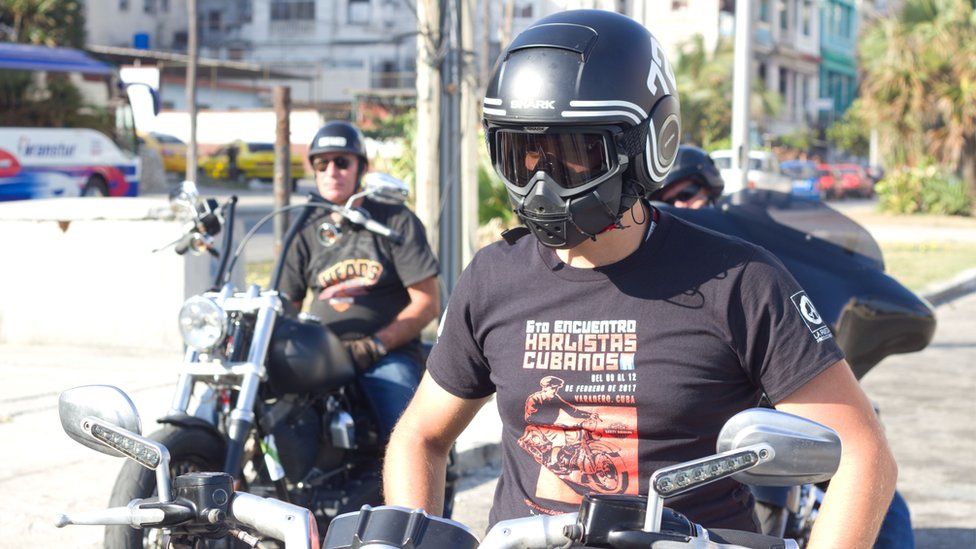
Despite the famous surname, Ernesto insists he is very much his own man.
"I always try to not link things. Anything I've achieved I've done as Ernesto Guevara March - as myself, as a human being," said the son from Che's second marriage to Cuban Aleida March.
"I do everything with a sense of responsibility. If it works out, then great. If not, fair enough."
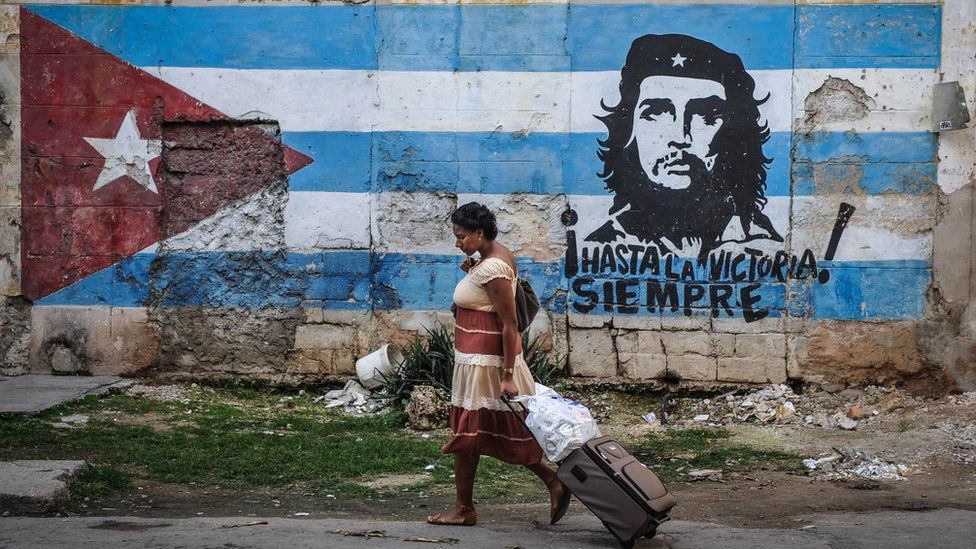
So far, it's a business philosophy that has served him well. Last year saw record numbers of tourists visit Cuba and business at La Poderosa Tours is brisk.
He knows he has his critics though, particularly in Miami. It is often pointed out that after being born with such Marxist credentials, the younger Guevara has made a capitalist's career in tourism.
It's not a charge that worries him, however.
"It has nothing to do with whether it's socialist or capitalist," he argued with a hint of indignation in his voice.
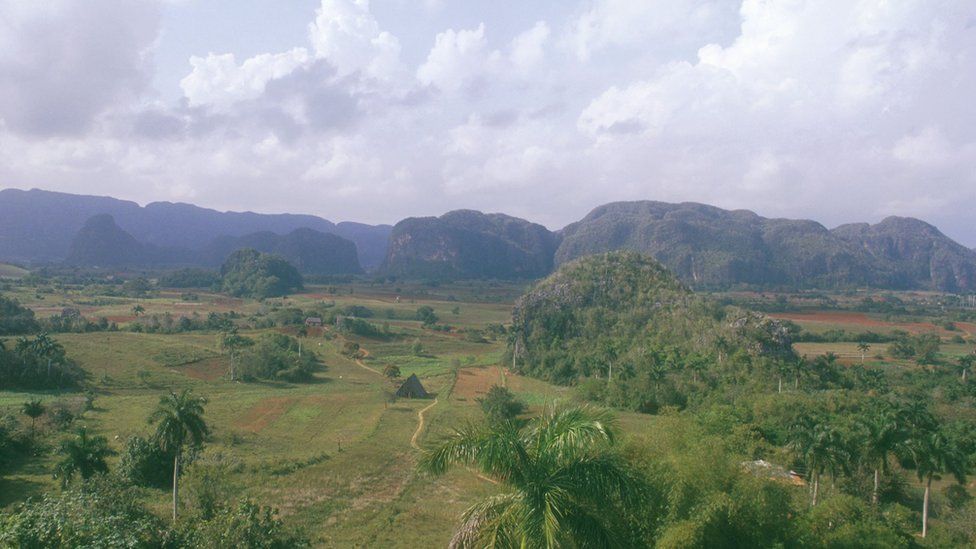
"It makes no sense to focus on that issue. For me, we're doing a good job, one that helps my country."
Our tour carried on to a place synonymous with the darker side of his father's image, the Cabaña Fortress.
It was here that after the revolutionaries took power, Che presided over the revolutionary trials of members of the ousted military government. Dozens were executed in what critics of the Cuban Revolution say was summary justice.
Fifty years after his father's death, Ernesto still leaps to his defence insisting the trials were "normal". I pointed out that such a view will incense some families the other side of the Florida Straits.
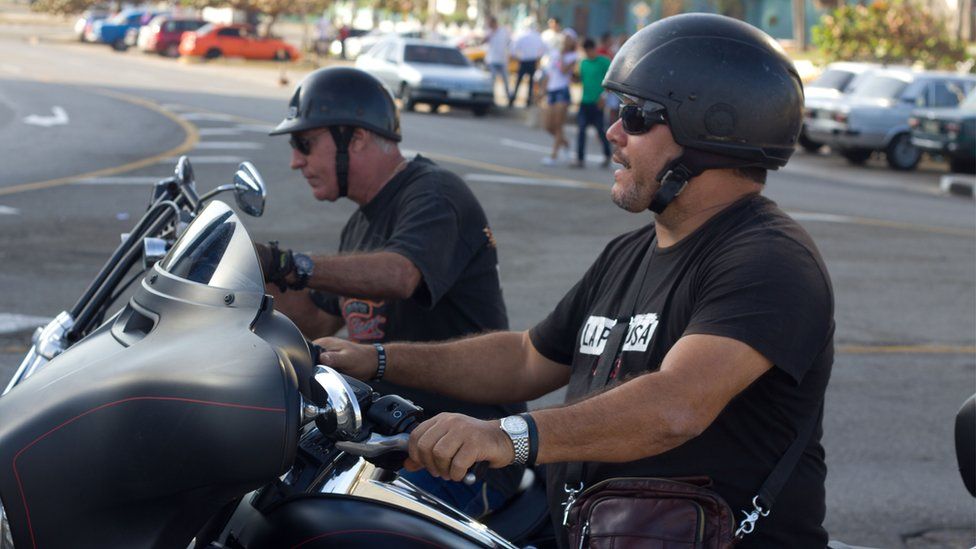
"The enemy can say what he likes. The people of Cuba know why it was done, how it was done, and above all in order to bring tranquillity to all Cuban society that they weren't going to pardon murderers of that kind," he said looking out across the bay to Havana.
"So I'm very calm, my soul is at peace, and my father's soul is too."
Ernesto readily admits it wasn't always easy growing up with a famous father - or rather, without one. Che Guevara was executed in Bolivia in 1967 when Ernesto was just two.
"Of course, at school sometimes you'd be pointed out as 'Ernesto Guevara', but generally you were known as 'Ernesto Guevara March', which is the person you are. The son of both your father and your mother."
And as the worldwide fascination with his iconic father shows no signs of slowing down, this has become a point the younger Ernesto is keen to stress.
"Those who love me, love me for the person I am. Not just for the name Guevara."
After 50 years of silence, Che Guevara's brother reveals the man behind the myth
The image doesn't need to be described because it's ubiquitous.
It's a 1960 photo of Che Guevara by Castro's official photographer, Alberto Korda, and it's one of the most copied and recognizable images of the past century. It even has a name, "Guerrillero Heroico," and since Guevara's execution 50 years ago, the image has become an avatar for vast and contradictory ideas.
But Che Guevara's brother says it's an inaccurate illustration of the man himself.
"It's not really representative of the person that I know. Neither Ernesto, my brother, nor Che Guevara. In all the photos that our family has of him, he's either smiling or he's looking ironic or he's looking comical."
Juan Martin Guevara, 72, is speaking to me from Buenos Aires. His eldest sibling, Ernesto Guevara was 15 when he was born. In his memoir, Che, My Brother, Juan Martin remembers Ernesto as a mercurial and prodigious figure. He was just five years old when Ernesto set out on the first of his formative motorcycle expeditions exploring South America.
Che Guevara's early years, in photos
"He was forever coming and going," Juan Martin writes.
By the time Juan Martin was 12, his brother was fighting a guerilla war alongside Fidel Castro against the Batista regime and then suddenly he was famous. He was Che.
"From 1957 onwards, I was the brother of the legendary Ernesto Guevara, Fidel Castro's companion and a fearless warrior. And then a legend. I learned to live with this."
Ernesto and Juan Martin and their father Ernesto in 1943 or '44. (Courtesy Juan Martin Guevara)
The pre-Che years
Juan Martin says his family's story can be divided into the pre- and post-Che years, a line drawn by history and the fame or infamy of his brother the revolutionary. In the pre-Che years, his memoir places Ernesto at the centre of a chaotic and eccentric household.
"He was not your traditional big brother, the one that would step in as an authority figure when Dad wasn't around. He was more of a comrade, or a friend, somebody that I would play with. We would go to the soccer game together. In Spanish, there's a word compinche — you know, a buddy; a pal — somebody that's with you at all times, your sidekick."
Some have suggested that I lived in the shadow of Che Guevara. I always say, 'No, I live in the light of what it is.'
- Juan Martin Guevara
Even before Ernesto left Argentina for good, he was frequently not at home, sleeping elsewhere as he completed his medical studies. Juan Martin admits in his memoir that Che could be distant with people he loved, but remembers an older brother who was warm to his much younger sibling.
"Irony and wordplay was our bread and butter in our family. And that is something that he kept with him throughout his life."
I ask if it was difficult to share the name Guevara with such a polarizing, powerful figure.
"I mean, some people have suggested that I lived in the shadow of what Che Guevara had been," he says. "I always say, 'No, I live in the light of what it is.'"
 Juan Martin, Ernesto, and their mother in 1959. (Courtesy Juan Martin Guevara)
Juan Martin, Ernesto, and their mother in 1959. (Courtesy Juan Martin Guevara)
Humanizing an icon
There's an ambivalence that runs through Juan Martin's memoir, a desire to keep distance from the mythic image of Che Guevara while still deeply admiring his brother. For years, he and other members of his family were determined not to talk about Che.
There were practical reasons to be discrete. Juan Martin was imprisoned by the Argentinian junta for eight years. During that time, thousands of political prisoners like him were "disappeared," thrown from airplanes into the ocean, or gunned down in summary executions.
He was freed in 1983.
"You have to understand, I was in prison," he tells me this week on Day 6. "So for me to go announcing that I was Che Guevara's brother was not such a good idea, being in prison under military junta. Others of my siblings fled the country in fear. There were bombings, shooting at my home because of this being Che Guevara's family.
"I decided much later in 2009, I understood that it's good to talk and that I needed to talk."
Juan Martin believes Che is relevant to the tumultuous contemporary world, that he can motivate young people and inspire change. He's not static and distant. His memoir takes on the myth of Che.
Che will be part of the history of humanity. I think Che's ideas will continue to influence across the globe.
- Juan Martin Guevara
"Myths are terribly tough to fight against. The way I approach it is try to humanize the man and you do that by providing content by giving substance and content to the man. That way you bring his feet hopefully closer to Earth; you have more understanding of who he really was and then perhaps an opportunity that you might want to follow."
Juan Martin believes contemporary idealists will find in Che a model for action if they can see beyond the totemic imagery. He complains Che's 3,000 pages of writings have been reduced by popular culture to his motorcycle diaries. He sees a dynamism and flexibility in Che and says his "thinking was changing constantly.
"Che's gift is that he can motivate people. So we must allow his influence to reach far and wide."
 Argentine
Communist revolutionary leader Ernesto "Che" Guevara in 1964 speaking
at the World Commerce and Development Conference at the Palace des
Nations at Geneva. (Keystone/Getty Images)
Argentine
Communist revolutionary leader Ernesto "Che" Guevara in 1964 speaking
at the World Commerce and Development Conference at the Palace des
Nations at Geneva. (Keystone/Getty Images)
Che the executioner
The romantic image of Che as Marxist idealist is far from universal.
After the revolution, Che oversaw trials and executions at Havana's fortress-like prison La Cabaña. Opponents of Castro and fighters supporting Batista were eliminated. American writer and journalist George Plimpton witnessed executions that appeared to be extrajudicial. It was a bloody time.
Juan Martin, in his mid-teens, was in Havana in 1959. He attended a trial and admits he found it disturbing.
"That trial was the only trial of many trials that was actually made public and that was the atmosphere that bothered me very much. This was done in a stadium. There were more than 5,000 members of the general public present and to see that person who was being judged who is clearly an assassin and a murderer. But to see that person surrounded by the mob — it was disturbing and I was not the only one that was disturbed by it.
"It's important for me to say [Che] was not in charge of those trials and executions. There were lawyers on both sides. There was a jury. Che was neither one of those."
Understandably, Juan Martin's memoir will not be well received by critics of Castro or his revolution.
"My support for the Cuban revolutionary process is unwavering," he writes.
I wondered how he reconciles political repression in Cuba with his eight years as a political prisoner in Argentina. He says that experience deepened his connection to Che's philosophy.
But what about Cuba's political prisoners? I asked Juan Martin how he thinks they feel about Che.
"Well, I understand what you're saying, I hear it clearly, I've heard it from others but I wanted to say, clearly, there are no political prisoners in Cuba," he replies.
In fact, Human Rights Watch identifies dozens of political prisoners in Cuba's jails.
 Juan
Martin Guevara, 73, poses with the book he wrote with journalist
Armelle Vincent on his brother, late Cuban revolutionary hero Ernesto
"Che" Guevara. (Charles Platiau/Reuters)
Juan
Martin Guevara, 73, poses with the book he wrote with journalist
Armelle Vincent on his brother, late Cuban revolutionary hero Ernesto
"Che" Guevara. (Charles Platiau/Reuters)
Cuba after Castro
Cuba will change as Castro's revolution recedes in time. Che is still revered on the island, though perhaps more as an icon than a thinker or writer. For now, Korda's image of Che still towers over the Plaza de la Revolución in Havana.
Next month marks the 50th anniversary of Che's death, but Juan Martin is convinced his brother's ideas will be part of the future of Cuba and beyond.
"Cuba's history is part of humanity, like the history of the USA, which I know is going through a lot of problems right now. You know, these are all parts of history, [and] you can't parcel off history.
"Che will be part of the history of humanity. I think Che's ideas will continue to influence across the globe."
https://www.bbc.com/news/magazine-34766886
How Che Guevara's home became a kitesurfing haven
By Will Grant
BBC News, Tarara
Published
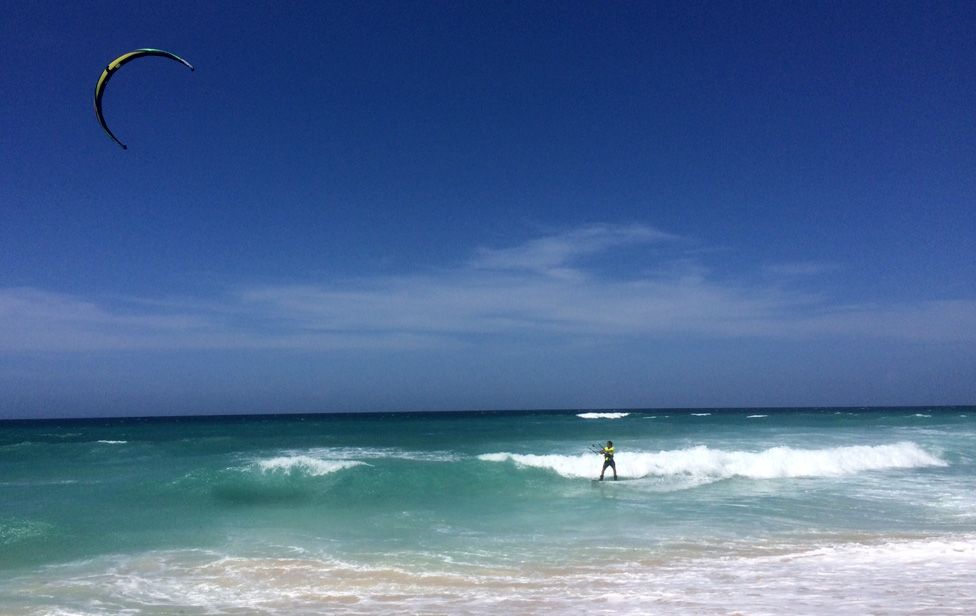
Once a seaside getaway for Cuba's wealthy and the honeymoon home of Che Guevara, Tarara is now becoming a centre for kitesurfing and other water sports.
Shortly after the Cuban revolutionaries took power in Havana, Ernesto "Che" Guevara suffered an acute asthma attack. To recover, he moved out to a house in a small resort outside the capital called Tarara.
Pristine Caribbean beaches, crystal-clear waters and - crucially for Che's lungs - clean coastal air, Tarara's unique microclimate was the perfect setting in which to recuperate from the months of jungle warfare against Fulgencio Batista's army. By all accounts, Guevara didn't rest much, holding long meetings late into the night with his comrades.
Still, his wife, Aleida March, remembers their few weeks in Tarara fondly:
"We only lived in that house for two months and, although it never became much of a home, I have happy memories of that time," she wrote in her autobiography.
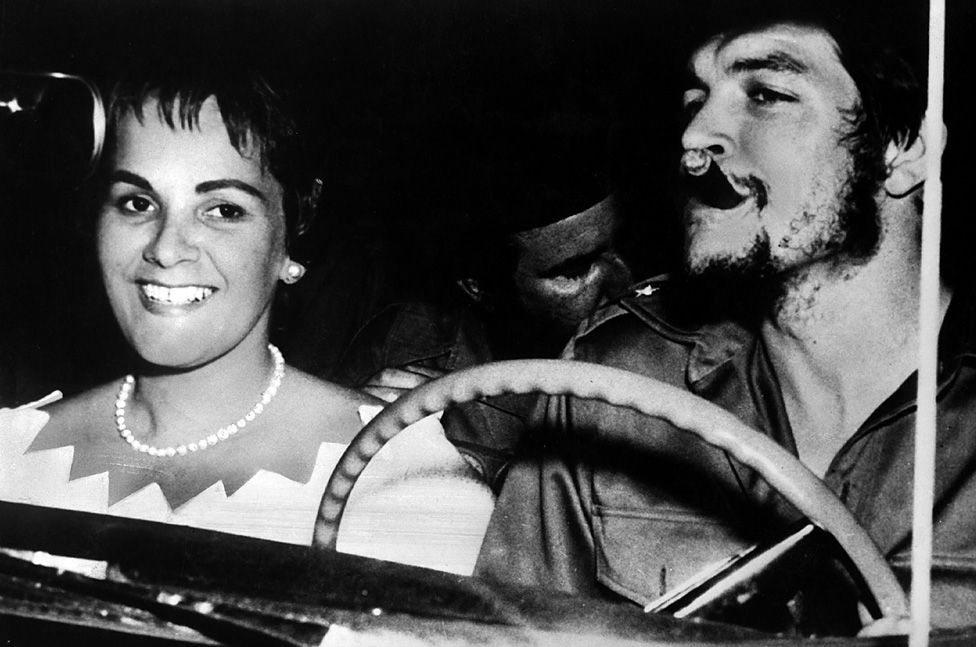
So much so that the couple returned to the resort for a short honeymoon a few months later.
Built in the 1940s and 1950s, Tarara began life as a seaside getaway for Havana's wealthy families and the military elites of Batista's government. In fact, the house where Che Guevara stayed had previously belonged to "a customs official with links to the dictatorship", wrote March.
But once Fidel Castro took over, most of the residents fled into exile or were forced out.
Today most of the 500 homes in Tarara belong to the state. Many are in disrepair, frozen in time as though the families who lived in them in 1959 had only just gathered together their belongings and made their hasty exit to Miami.
The small town has played a number of roles over the years.
At the height of the Cold War, it housed Soviet officials working as government advisors in Cuba. But after the fall of the Berlin Wall, the resort was used by an altogether more needy group of visitors from the former Soviet bloc.
Thousands of children affected by the Chernobyl nuclear disaster of 1986 came to Tarara as part of a government-run treatment programme. From 1990, the wards of the Tarara Paediatric Hospital were full of children from Russia, Ukraine and Belarus, many suffering from cancers and incurable skin conditions, hoping to benefit from the same restorative airs as Che Guevara decades earlier.
More recently, patients from Venezuela have received cataract treatment at the resort as part of the renowned "oil-for-doctors" agreement in which Cuba pays for Venezuelan oil with healthcare.
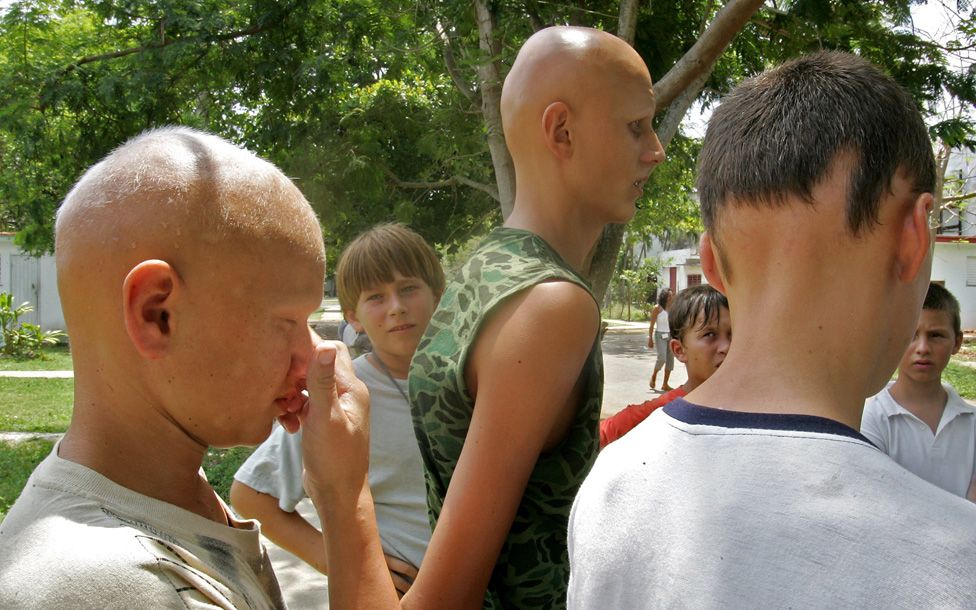
But take a drive around Tarara today and you're unlikely to find many Venezuelan eye patients or children from Ukraine, but rather kitesurfing enthusiasts from around the world. The small resort boasts the ideal wind conditions for water sports and gradually word is getting out.
"There's very big potential for kite-surfing in Cuba, but especially here in Tarara," says Matteo Gatti, a tousled-looking 40-something Italian who's the brains behind the town's new surfer identity. "We want to make this a sports village where people come to do kitesurfing, paddleboarding, wakeboarding, yoga and cycling."
"During the hurricane season in Cuba, there is a very good side-on wind and the beaches are empty," says Gatti, his Cuban-Spanish inflected with Italian. "By day you can kitesurf and at night you can go dancing, go to restaurants or see a concert because Havana is just 10 minutes away. They're perfect conditions."
Gatti may be right. As holiday destinations go, the location could hardly be better.
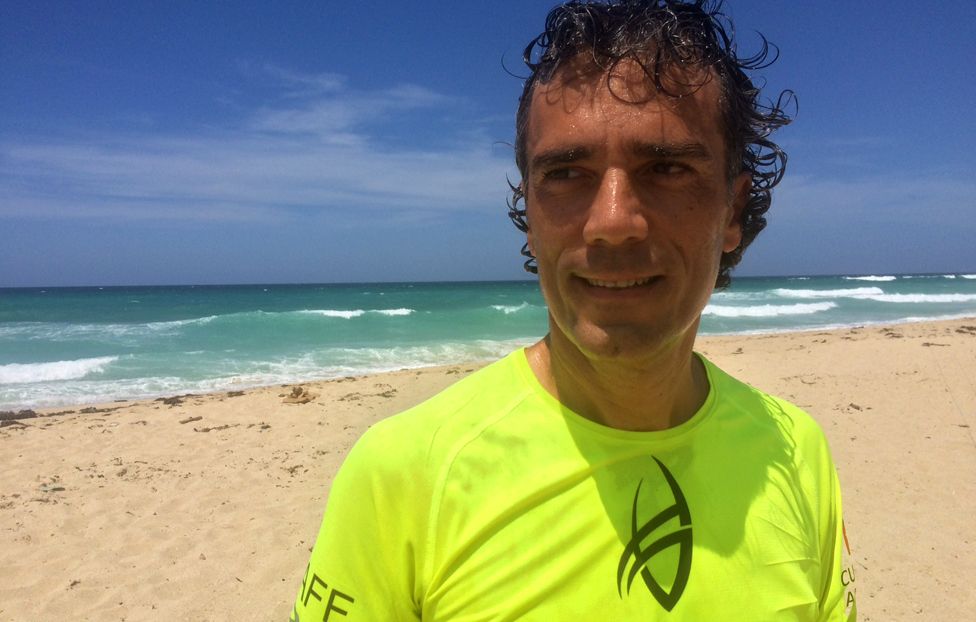
But it won't be easy to realise his dream of turning Tarara into a Caribbean hub for extreme water sports.
He's got the timing right, as Cuba gradually opens its doors to foreign investors, especially in tourism. But he has had to wade through layers of bureaucracy and paperwork to obtain the rights to operate his fledgling business, Havana Kitesurf Club, out of a little office in Tarara.
"We have this permission from the government because I use Cuban people, Cuban instructors," he explains. Later, one of them, Julio, gives me my first lesson on the shore.
He shows me how to manoeuvre the vast multicoloured kite by imagining the hands of the clock in the sky and weaving it back and forth around the 12 o'clock position.
The idea of manipulating the cumbersome frame while riding a surfboard out at sea seems pretty daunting. For now, I just focus on avoiding bringing it crashing down on the few sunbathers enjoying a picnic on the beach.
"We're organising an international kitesurfing competition here next year," Gatti tells me, his enthusiasm infectious.
One wonders what Che would make of a worldwide surf contest in his honeymoon home. Then again, one wonders what he'd make of all the recent changes in Cuba.
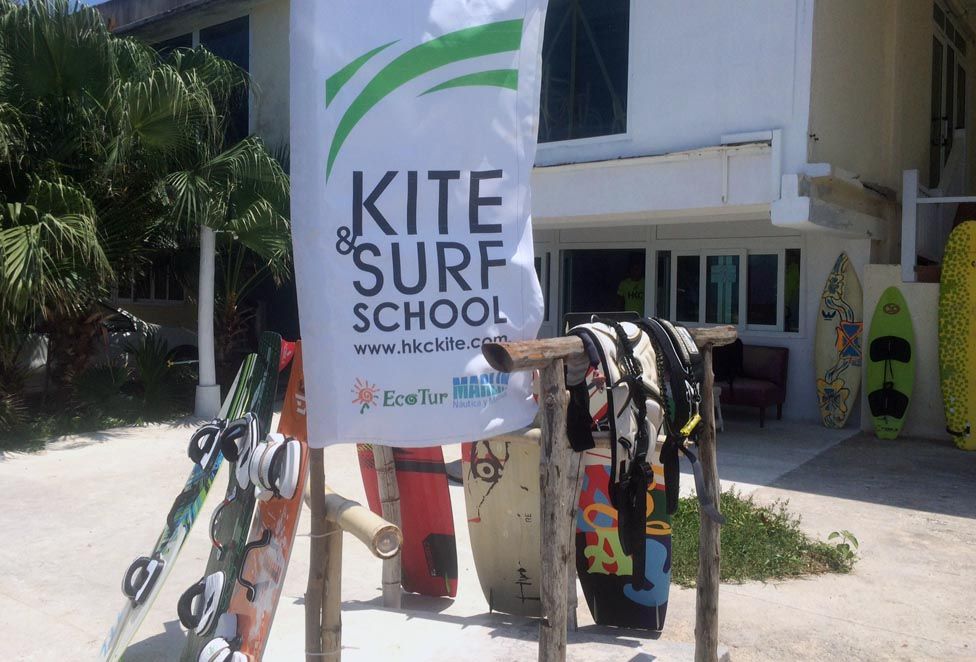
How to listen to From Our Own Correspondent:
BBC Radio 4: Saturdays at 11:30. Listen online or download the podcast.
BBC World Service: At weekends - see World Service programme schedule or listen online.
Subscribe to the BBC News Magazine's email newsletter to get articles sent to your inbox.












 Strong physical resemblance aside, the Cuban rumors are also backed up by historical fact.
Strong physical resemblance aside, the Cuban rumors are also backed up by historical fact.



Hello,
ReplyDeleteI'm Dr Ogudugu, a real and genuine spell caster/Spiritual healer with years of experience in spell casting and an expert in all spells, i specialize exclusively in LOVE SPELL/GET REUNITE WITH EX LOVER, MONEY SPELL, POWERFUL MAGIC RING, ANY COURT CASES, FRUIT OF THE WOMB, HIV CURE, CURE FOR CANCER, HERPES, DIABETE, HERPERTITIS B, PARKINSON’S HERBAL CURE, BECOMING A MERMAID, BECOMING A VAMPIRE, SAVE CHILD BIRTH. They are all %100 Guaranteed QUICK Results, it most work. If you have any problem and you need a real and genuine spell caster to solve your problems, contact me now through my personal Email Address with problem case...Note-you can also Text/Call on WhatsApp.
Contact me -
Email: greatogudugu@gmail.com
WhatsApp No: +27663492930